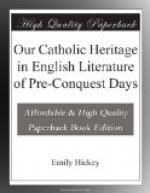Cynewulf knew well the story of Constantine’s vision of the Cross of Victory whereby he was to conquer. He would also have had in mind the story, not so far remote from his own day, of the English King, St Oswald, who reared a cross to God’s honour before he fought with Cadwalla, the pagan Welsh king. He would remember how the Saint had called upon his comrades at Heavenfield to fall down with him before the Cross and pray Almighty God for salvation from the mighty foe. He would recall the great victory and the cross-shaped church built to commemorate it. He knew well the honour of the Cross. He had often knelt to adore what it symbolised, when he saw it raised on high, lifted up on the Church’s Festival. And he loved the Cross with a great and fervid love.
The poem of his making tells us how the great army of the Huns and Goths[E] came against Constantine; how the warriors marched on, having raised the standard of war with shoutings and the clashing of shields. Bright shone their darts and their coats of linked mail. The wolf in the wood howled out the song of war; he kept not the secret of the slaughter. The dewy-feathered eagle raised a song on the track of the foe.
[Footnote E: This, of course, is unhistorical.]
The King of the Romans was sorrow-smitten when he saw the countless host of the foreign men upon the river-bank. In his sleep that night came the vision of one in the likeness of a man, white and bright of hue. The messenger named him by his name. The helmet of night glided apart. The behest was given to look up to Heaven to find help, a token of victory. The Emperor’s heart was opened and he looked up as the angel, the lovely weaver of peace, had bidden him. Above the roof of clouds he saw the Tree of Glory with its words of promise. The great battle came, when the Holy Sign was borne forth. Loud sang the trumpets. The raven was glad thereof, and the dewy-feathered eagle looked on at the march, and the wolf lifted up his howling. The terror of war was there, the clash of shields and the mingling of men, and the heavy sword-swing and the felling of warriors.
When the standard was raised, the Holy Tree, the foe was scattered far and wide. From break of day till eventide the flying foe was pursued; his number was indeed made small. It was but a few of the best of the Huns that went home again.
How the old fighting spirit delights in the “pomp and circumstance of glorious war”! How it loves to have the clash of spear and shield strike upon the ear, and to hear how the voice of the eagle and the raven, and the howl of the wolf, proclaim the place of slaughter, the reek of battle!
Cynewulf calls the angel who stood by Constantine in his vision a “weaver of peace”; but the peace was to be woven after conflict, and the wearer of the victor’s palm had first to wield the fighter’s sword.
When Constantine had learned about the Cross from the few Christians he could find, he believed and was baptized, says the poet. (In reality his baptism took place just before his death, several years later.)




